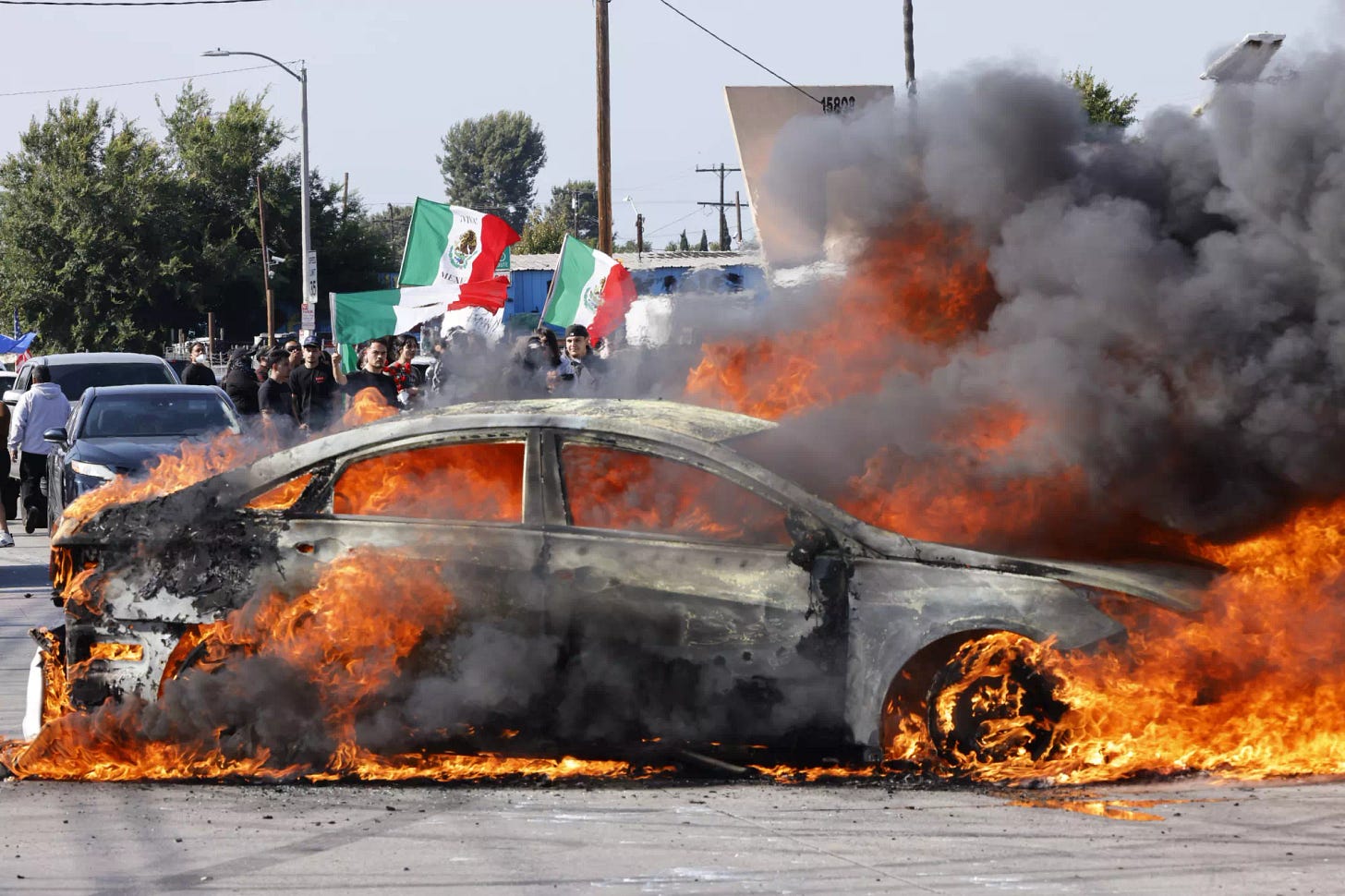Troops in the Streets: Trump Sends National Guard to L.A. as Immigration Protests Boil Over
With flashpoints erupting across the city, the sudden federal deployment—without California’s request—signals a chilling shift in how dissent is being met
The Trump administration said it would send 2,000 National Guard troops into Los Angeles after a second day in which protesters confronted immigration agents during raids of local businesses. The move marks a major escalation in Trump’s crackdown on illegal immigration and came amid concerns from some officials in California. The Guard has been deployed to Los Angeles previously, but it has been during widespread civil unrest, including the upheaval associated with the 2020 protests following the murder of George Floyd, as well as the riots that occurred after the Rodney King verdict in 1992. Los Angeles has seen several violent clashes during the recent immigration raids, but they have been limited to isolated areas including the Home Depot in Paramount, a location in L.A.’s fashion district and at the Civic Center. Jessica Levinson, a law professor at Loyola Law School, noted that when the National Guard was sent to L.A. before, it was because California requested it and the response was coordinated. But he called the move very troubling. Such deployment typically happen during “extreme circumstances. ... Here it seems it was an early response. And I fear that is to send a message to protesters of the willingness of the federal government to use federal troops to quell protests.” - LA Times
Juliette Kayyem, a national security, intelligence and terrorism analyst for CNN, told the network that Donald Trump has gone over the heads of state officials and made a bad decision to deploy federalized troops to California. “In this case there were unlawful and not peaceful protests. What is a concern is the response…you want to respond to the threat level. To determine what he was seeing justified the federalization of these troops, this is unprecedented. While unrestful it is not at the level you want to deploy federalized troops. Looking at what’s happening on the ground - is this the floor that justified a president to threaten active military? I have been in this field a long time and the answer is ‘No.’”
Looking at what’s happening on the ground - is this the floor that justified a president to threaten active military? I have been in this field a long time and the answer is ‘No.’ - Juliette Kayyem, a national security, intelligence and terrorism analyst for CNN
The White House has urged Downing Street to block plans for a new Chinese “super embassy” near London’s financial districts. Construction of the building was blocked amid espionage fears from local residents, as well as human rights campaigners and politicians. But the plan has been revived, with Angela Rayner “calling in” the decision last year and ministers due to make the call on whether the hugely-controversial embassy should go ahead. China’s President Xi Jinping is said to have personally lobbied No 10 for the complex at Royal Mint Court in East Smithfield. It is also believed Chinese foreign minister Wang Yi brought up the matter with Foreign Secretary David Lammy while visiting the capital last year. The proposed site lies directly between the City of London and Canary Wharf and close to three significant data centres. Security experts say its proximity to critical communication cables makes it susceptible to a possible cyber attack. It is understood that US President Donald Trump has warned Prime Minister Sir Keir Starmer against giving the project the go-ahead. The matter is believed to have been discussed during trade talks, with American diplomats trepidatious about sharing intelligence with British allies if the embassy went ahead. The proposal for the China's embassy, the country’s largest in Europe, was previously rejected by Tower Hamlets Council in 2022. However, a fortnight after Chancellor Rachel Reeves came back from a visit to Beijing in January, both the local authority and Scotland Yard's objections were dropped - London Evening Standard
Russia’s domestic security agency, known as the F.S.B., has referred to the Chinese as “the enemy” and has warned that China is a serious threat to Russian security. Its officers say that Beijing is increasingly trying to recruit Russian spies and get its hands on sensitive military technology, at times by luring disaffected Russian scientists. The intelligence officers say that China is spying on the Russian military’s operations in Ukraine to learn about Western weapons and warfare. They fear that Chinese academics are laying the groundwork to make claims on Russian territory. And they have warned that Chinese intelligence agents are carrying out espionage in the Arctic using mining firms and university research centers as cover. The threats are laid out in an eight-page internal F.S.B. planning document, obtained by The New York Times, that sets priorities for fending off Chinese espionage. The document is undated, raising the possibility that it is a draft, though it appears from context to have been written in late 2023 or early 2024 - NYT
Support Independent Global Reporting — Subscribe to World Briefing
Welcome to World Briefing Weekend, coming to you today from Kyiv, Ukraine. In a world awash with noise, World Briefing cuts through the chaos with clear, on-the-ground insight into the stories shaping our world—from war zones and political flashpoints to the quiet shifts you won’t see on the evening news.
If you value:
Reporting that holds power to account
Context that connects the dots
And a voice that isn’t beholden to corporate or partisan agendas
…then I hope you’ll consider becoming a paid subscriber.
Your support makes this work possible. It means more time in the field, more interviews with people living the headlines—and fewer barriers between you and the truth.
Join the readers who believe global news deserves depth, independence, and urgency.
👉 Subscribe now – starting at just a few dollars a month.
Thank you for reading and being part of this community.
Yesterday, there were apocalyptic scenes out of Kharkiv - Ukraine’s second largest city - from overnight Russia attacks. There were about 40 explosions over 90-minutes, the city’s mayor says. I told the BBC that if the feared Russian summer offensive continues unabated, it could displace upwards of a quarter-of-a-million people. Watch above.
The Russia-backed Wagner Group said Friday it is leaving Mali after more than three and a half years of fighting Islamic extremists and insurgents in the country. Despite Wagner’s announcement, Russia will continue to have a mercenary presence in the West African country. The Africa Corps, Russia’s state-controlled paramilitary force, said on its Telegram channel Friday that Wagner’s departure would not introduce any changes and the Russian contingent will remain in Mali. “Mission accomplished. Private Military Company Wagner returns home,” the group announced via its channel on the messaging app Telegram. It said it had brought all regional capitals under control of the Malian army, pushed out armed militants and killed their commanders. Mali, along with neighbors Burkina Faso and Niger, has for more than a decade battled an insurgency fought by armed groups, including some allied with al-Qaida and the Islamic State group - NBC News
Current Russian troop movements and battlefield dynamics indicate that the coming summer offensive may be one of the largest and most ambitious of the entire Ukraine war. If successful, this campaign could allow Russian troops to push the front line tens of kilometers forward into Ukrainian-held territory and overrun parts of Ukraine’s Donetsk, Luhansk, Zaporizhzhia, and Dnipropetrovsk, and Sumy oblasts, according to the Kyiv-based East Europe Foundation and UN data. Separately, Ukrainian media channels reported today that Russian forces were less than 20 kilometers away from the city of Sumy, which once had a population of about 250,000. Russia has already amassed tens of thousands of troops in the region and occupied several villages. If the offensive continues unabated, it could displace more than 200,000 people, placing pressure on the resources of Ukraine and neighbouring states.
Russia claims it has begun transporting the frozen bodies of 1,212 Ukrainian servicemen toward the Ukrainian border by train. According to Moscow, the remains were identified "by their uniforms and the areas where they were found." The trains reportedly began moving on Sunday, following talks held last week in Istanbul. Russian officials say the transfers are in line with the agreement reached during those negotiations. However, Ukrainian authorities contest this, saying there was no agreement on the timing of the exchange—raising uncertainty over whether the repatriation will actually go ahead, CNN reported. Typically, prisoner and body exchanges between the two countries are more tightly coordinated. This unusual discrepancy suggests a breakdown in communication—or trust—between the sides at a moment when tensions remain high.
More than 130 media organizations have signed an open letter calling on Israel to allow "immediate, independent, and unrestricted international media access to Gaza and for full protection of journalists who continue to report under siege." The letter, published under the banners of the Committee to Protect Journalists and Reporters sans Frontieres, says: “For 20 months, the Israeli authorities have refused to grant journalists outside of Gaza independent access to the Palestinian territory – a situation that is without precedent in modern warfare. Local journalists, those best positioned to tell the truth, face displacement and starvation. To date, nearly 200 journalists have been killed by the Israeli military. Many more have been injured and face constant threats to their lives for doing their jobs: bearing witness. This is a direct attack on press freedom and the right to information….At this pivotal moment, with renewed military action and efforts to resume the flow of humanitarian aid into Gaza, it is vital that Israel open Gaza’s borders for international journalists to be able to report freely and that Israel abides by its international obligations to protect journalists as civilians.”
Bangladesh and India are reportedly to have established direct lines of communication with an ethnic army in Myanmar after its forces were able to take control of the countries borders with both neighbors. The Arakan Army (AA) has achieved major gains since launching its Rakhine offensive in November 2023, seizing control of 14 out of 17 townships in the western state - effectively securing the entire border with India and Bangladesh. This military achievement has led to notable political shifts, the Irrawaddy reported. With the AA now in full control of the borders, both the Indian and Bangladeshi governments have had to engage with the ethnic army while stopping short of officially recognizing it. Bangladesh is in direct contact with the AA, while India is engaging through the Mizoram state government. Reports suggest that the AA has even opened an office in Mizoram.
Authorities in Phnom Penh say they are prepared to use aggressive measures to maintain public order, starting early next week, in the Cambodian capital’s popular French Quarter area. Chap Dina, Deputy Governor of Daun Penh District, said that security, order, and cleanliness are essential tasks that must be given high consideration in order to maintain local well-being, while the area is a tourist area with many tourists visiting the area for entertainment. Phnom Penh has been ranked second among the 14 Best Nightlife Cities in the World by VISA2FLY, an online visa platform - Khmer Times






